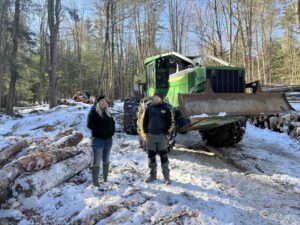Women in the Industry
Jenee Smith
By Erin Kessler

“What brought Ray and I to the woods?” Jenee Smith ponders the question. Logging
had been part of her husband Ray Brewster’s life from a young age, while Smith had
grown up cutting trees, pulling brush, and splitting firewood with her six siblings.
“As a baby, my mom would put me in a stroller and the sound of a chainsaw would put me
to sleep. To this day, I can’t help but start yawning when I hear a chainsaw.” Growing
up, Smith says she had a lot less than others, but her parents worked hard. They
started two businesses: an electric motor shop, and a house rental business. “Seeing
where I came from and where my parents are today is what drove me to want to start my
own business. Those weekends growing up chopping wood with my family are some of my
happiest memories, and I guess that also led me back into the woods as an adult.”
For the last six years, Smith has been the forwarder and skidder operator, logging
truck driver, bookkeeper, and equipment buyer for Legendary Landworks, LLC, a logging
contracting company that she runs with her husband, based in Granville, New York. When
she first met Brewster, she says that he would take her out on dates and they would
talk for hours, dreaming up different businesses that they could start together. In the
end, with Brewster’s background in logging (he’d logged with his extended family since
he was 16), and Smith’s business school studies (she’d gone to Hunter College) they
eventually started a logging company.
It took a while for the logging part of the business to get going. Smith, along
with all the women in her immediate family – her mother and her sisters – has a CDL.
And both she and Brewster have their Class A license, so naturally, they started out
doing only trucking for a while with a tractor-trailer and a low bed.
Things changed when they were contracted to haul some equipment for another logger
in the area who had a processor and a forwarder. They’d never seen a cut-to-length
(CTL) operation before. Being tired of trucking for other people, they decided to go
all in with CTL logging. Since then, it’s been a steep learning curve, but they’ve
always had steady work (weather permitting). Brewster runs the processor and feller
buncher, and still delivers log loads with their Kenworth, while Smith does the books,
trucks wood sometimes, and runs everything else.
The woodlot Smith and Brewster have been working on since the summer of 2023 (off
and on), and which they plan to finish up this winter (hopefully), is a privately owned
parcel in the 480a forest tax law program, on the edge of the eastern Adirondacks. The
400-acre piece of land has been held within the same family for the last 70 years, and
according to the forester on the job, Jim Allen, it has been managed well over the
years. Since January, Legendary Landworks has been dedicated to a quadrant on the
property located on a steep slope populated with mainly hemlock and pine.
“There are many things that I’ve learned since we started in the logging business
from trial and error, making mistakes, and investing a lot of money in different types
of equipment,” Smith says. They’ve switched up equipment more than once when things
didn’t work out as expected. “I wish I had known what I know now 10 years ago.”
They started with a Valmet forwarder, then replaced it with a Rottne forwarder, and
then switched to a Ponsse forwarder and processor. In the last month, she and Ray
decided to sell the forwarder. They now have a John Deere skidder and feller buncher.
In this era of climate change, CTL has become more common in the Northeast. Both
believe that CTL is great for certain types of terrain and species, and low impact
logging. “It’s great on paper,” says Smith. But using forwarders on the steep and rocky
areas that surround their home base has proved challenging, especially in snowy and icy
conditions. “I’ve almost tipped over a few times,” she says. They’ve had to turn down a
lot of local jobs because they simply couldn’t make a forwarder work and be productive
on the steep geography.
Smith had been operating a Ponsse Wisent forwarder, the smallest available, that
she’d bought from Michigan. Parts had to be shipped overnight from Michigan, too.
Though she’d gotten used to it and prefers CTL in general, they’ve decided to give
mechanized logging a try, in hopes that it will increase production. Another reason why
the JD skidder is easier, she says, is that the dealership is only an hour away, in
Clifton Park. Now they’re able to go directly to the dealer and pick parts up the same
day.

There was a bit of a learning curve operating the skidder, Smith admits, mixed in
with some nerves since the skidder sits up around two feet higher than the forwarder
and all of the controls are “opposite.” But Smith dove right in and was skidding logs
to the landing on the first day, learning on the job. Brewster says that “Jenee is the
boss,” but they do talk a lot about strategy and make decisions about buying equipment
together. Smith is also in charge of all the paperwork, and this time of year – tax
season – is her most dreaded time of year for the business.
Also coming soon down the pipeline, is the possibility of new legislation on how to
deal with harvesting in the nesting habitat of the Northern long-eared bat (NLEB),
which was listed as an endangered species last year. The decision caused a lot of
confusion on whether or not, and where, you could log, with different states adopting
different directives. This year, new directives will be decided on March 31, effective
April 1, 2024. The area in which Legendary Landworks operates includes Finch Paper and
Sylvamo Ticonderoga Paper Mill (a crucial local pulp market), and is within two major
bat zones. If logging is restricted, this, Smith says, will be one of their biggest
challenges. Not being able to log within a 5-mile radius of bat habitats from April 1
to November 1 would put a nail in the coffin for many operators, and “it’s enough make
us sell out,” she says candidly.
Many situations are unpredictable when it comes to logging: weather, severe storms,
climate change, equipment failures, interest rates, and all kinds of new legislation.
Smith admits that she does worry about all of these things, while Brewster, who has the
countenance of calm in a stormy sea, takes everything in stride, even the NLEB
legislation. “They do this every once in a while,” he tells her. “Things will work
themselves out.”
At 26, Jenee has already experienced a lot. And she doesn’t plan to stop. She talks
rapidly about production rates, different tree species, her thoughts and observations
on the work she’s done, the types of prescriptions they’ve had to follow, and plans for
the future. Once they get on solid ground with their mechanized operation, Smith hopes
to hire a skidder operator so she can focus more on the business side of things,
hauling logs in the Kenworth with her dog Jax (she prefers being in a truck cab), and
spending more time with her four-year-old daughter. NL
